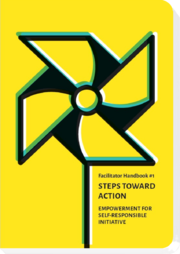Goal
Organizations and facilitators understand how their mission, purpose and learning activities relate to key competencies. They gain information on how they already include competency orientation in their activities. They get an insight about the potential of competency orientation for their activities.
Steps
Connecting to your social purpose
Ask in four smaller groups or in a moderated plenary setting what your mission or purpose is.
- Why are you important for the society?
- What are your internal drivers?
- Inspiration: Task: Start with "Why"
Write down or notice your findings.
Introduction of Key Competencies
Key Competencies are such abilities, understood as the whole set of knowledge, attitudes and skills, that are useful for individuals in a lot of different situations and social contexts. Therefore we look on our activities from two perspectives:
- the learner, participant or visitor: What gain of knowledge skills and attitudes could this person expect thanks to your activities?
- the different social sectors: What competencies are very important and relevant in these social contexts;
- 1. economical wellbeing,
- 2. cultural expressing,
- 3. social engagement and
- 4. personal/personality development?
Sector Groups
Divide the group in four groups or keep the four groups from the beginning. Give every goup one of the following questions:
- What competencies can a learner/participant/visitor take out for personality/personal development?
- What competencies can an employee gain in your activities for economic wellbeing?
- What competencies for their cultural expression could learners/visitors/participants gain in our activities?
*What competencies for involvement in social groups and public discussions and decisionmaking processes can a citizen gain in our activities?
Take care, thatparticipants take the perspective of their learners/participants/visitors:
- "As a visitor/participant/learner I'd gain this competence:..."
Collection in a plenary setting
Invite each group to present their relevant competencies. The facilitator writes them on cards, using one card for one competency. Take care to write the competencies mentioned by one group on cards of the same color. In example: economy white, culture blue, individual development yellow, engagement red.
Lay the cards on a table or on the floor, separated by the color/groups.
Clustering
After the last group finished their presentation it's time to look on similarities. We could imagine that the following categories are helpful for orientation:
- personality development/personal competencies
- civil engagement
- team and group cooperation
- communication/understanding
- specific knowledge
- specific methodology
...and others that are important in your context
Reflection
The more colorful mixed the clusters are, the more this indicates that your work has a strong potential for competency development.
- What is suprising?
- What is confirming you in your self-perception and own analysis?
- What aspects need further exploration?
Reality check:
- Is our competency model adequately communicated?
- How could competency orientation help us in the aquisition of learners, visitors, participants?
- Are we already doing, what we have explored here?
Variation
After this collection and clustering a more precise step might follow. The identified clusters can be analyzed by using the key competency model we introduced with Competendo. Distinguish between knowledge, methodological skills, social and personal skills: *
The task can also be a starting point for a concise description of learners' competency development, in example for certificates:
Experience
This task is useful in diverse contests. It helps organizations and projects intending to have an impact on behavior and behavioral change of citizens to identify the potential of looking on their activities with the perspektive of competency orientation.
It helps organizations and facilitators to prioritize and to adapt their curricula and programs to the needs of learners.
It helps to improve communication by telling more precise how one affects individuals and shows how one addresses social change from a human perspective.




